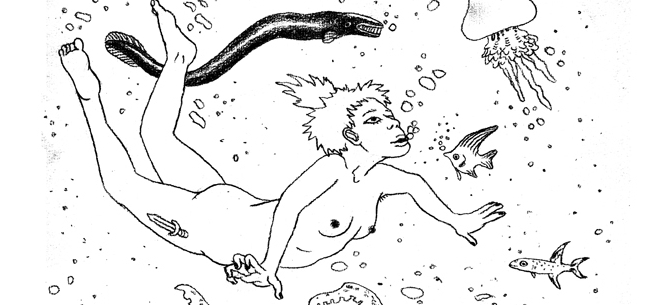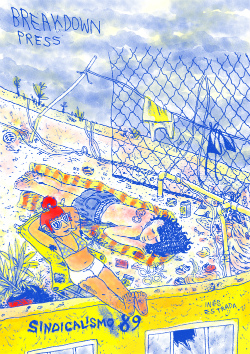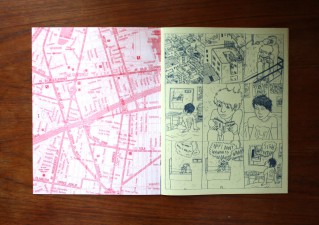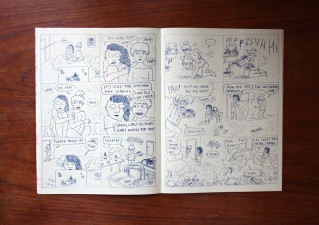 It was Latvian publisher kuš komiksi who first introduced me to the work of Mexican comics creator Inés Estrada, and the grotesque near-psychedelia of her Borrowed Tails minicomic (mini kuš #17 – reviewed here at Broken Frontier) remains one of the most memorable offerings I have read from their range to date. Estrada’s Sindicalismo 89 – brought to us by rising stars on the UK micropublishing scene Breakdown Press – is a very different piece of storytelling to that comic but no less unsettling in its own way. An account of life in a bustling Mexican apartment building, it’s a curious mix of slacker comedy, social commentary and sudden, brutal pathos.
It was Latvian publisher kuš komiksi who first introduced me to the work of Mexican comics creator Inés Estrada, and the grotesque near-psychedelia of her Borrowed Tails minicomic (mini kuš #17 – reviewed here at Broken Frontier) remains one of the most memorable offerings I have read from their range to date. Estrada’s Sindicalismo 89 – brought to us by rising stars on the UK micropublishing scene Breakdown Press – is a very different piece of storytelling to that comic but no less unsettling in its own way. An account of life in a bustling Mexican apartment building, it’s a curious mix of slacker comedy, social commentary and sudden, brutal pathos.
 The titular location is described as “a dysfunctional hive in the jungle capital” and it is, indeed, portrayed as almost a concrete organism in and of itself – the sprawling urban chaos of the city in microcosm. It’s here that we are introduced to the book’s colourful cast of players. There’s sexually frustrated adolescent Yoni who has what can only be described as a fractious relationship with his brother Pato. Across the building lives Yoni’s object of affection Mecha, and her flatmate Pau, whose lives seem to revolve around horror movies and partying with pal Beto.
The titular location is described as “a dysfunctional hive in the jungle capital” and it is, indeed, portrayed as almost a concrete organism in and of itself – the sprawling urban chaos of the city in microcosm. It’s here that we are introduced to the book’s colourful cast of players. There’s sexually frustrated adolescent Yoni who has what can only be described as a fractious relationship with his brother Pato. Across the building lives Yoni’s object of affection Mecha, and her flatmate Pau, whose lives seem to revolve around horror movies and partying with pal Beto.
Finally, we have the old lady who lives on the ground floor of the building with her dog Pipo. The daily grind for her is somehow completely detached from the pandemonium of the residents around her. Their environment is one she weaves around, content to exist within her own memories and the canine company of her pet, seemingly anaesthetised to the boisterous disarray of the block’s claustrophobic physicality.
Estrada builds up the audience’s interest in her characters by revealing information about them in increments, emphasising how the inhabitants are never fully aware of how profoundly their existences touch each others in small but significant ways. This is subtly underlined in the transitions between scenes which melt in and out of each of the cast’s individual but interconnected realities. When a moment of tragedy does strike within the block, its casual dismissal is all the more poignant for what the audience knows about the character that the fellow residents do not.
 Estrada uses a sketchy style to bring these individuals to life but it’s one that is well suited to depicting the frenetic energy, the swirling disorder, that is central to the world of Sindicalismo 89. Occasionally she adopts a cartoon-like sense of exaggeration that adds extra layers to the visual characterisation of her players – Yoni and Pato’s mother towering over them like a monstrously misshapen authority figure, or the old lady’s eyes popping out of her face in amusement as she begins a sexually themed anecdote that no one but her will ever hear, for example. Throughout, there’s a sense in each page not so much of oppressive confinement but rather dull and blithe acceptance of the status quo.
Estrada uses a sketchy style to bring these individuals to life but it’s one that is well suited to depicting the frenetic energy, the swirling disorder, that is central to the world of Sindicalismo 89. Occasionally she adopts a cartoon-like sense of exaggeration that adds extra layers to the visual characterisation of her players – Yoni and Pato’s mother towering over them like a monstrously misshapen authority figure, or the old lady’s eyes popping out of her face in amusement as she begins a sexually themed anecdote that no one but her will ever hear, for example. Throughout, there’s a sense in each page not so much of oppressive confinement but rather dull and blithe acceptance of the status quo.
 Ultimately the real strength of Sindicalismo 89 as a piece is not in any perceived humour in the moments of stoner philosophy surrounding the central duo of Mecha and Pau but in Estrada’s skilful observations of the tangential manner that lives in a block like this interrelate and impact on each other.
Ultimately the real strength of Sindicalismo 89 as a piece is not in any perceived humour in the moments of stoner philosophy surrounding the central duo of Mecha and Pau but in Estrada’s skilful observations of the tangential manner that lives in a block like this interrelate and impact on each other.
Indeed, these 31 pages are less about providing a structured plot that works its way to a natural conclusion and more about offering us fleeting snapshots into the turmoil of subsistence in this constrained arena. In that regard it’s a successful transportation of the readership to a situation that is both recognisable and comprehensible in scope yet simultaneously quite alien and, in its own way, somewhat terrifying in its bleakness. We can only hope that this is just the beginning of a long publishing relationship between Estrada and the team at Breakdown Press.
For more on the work of Inés Estrada visit her site here. You can order copies of Sindicalismo 89 here from Breakdown Press priced £6.00.
For regular updates on all things small press follow Andy Oliver on Twitter here.














